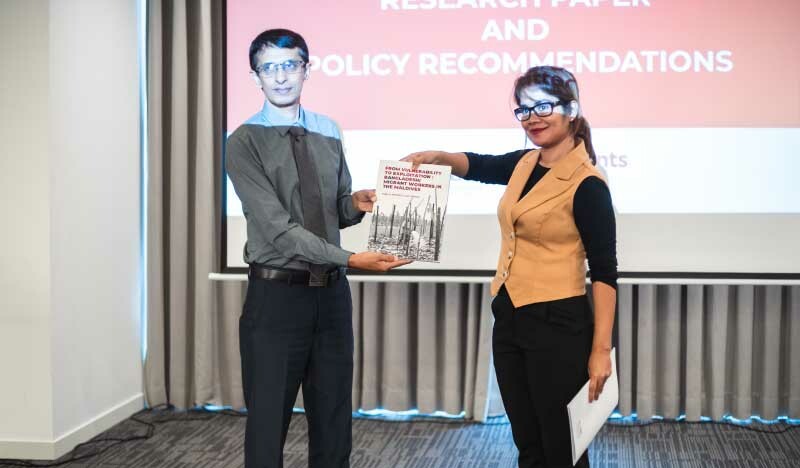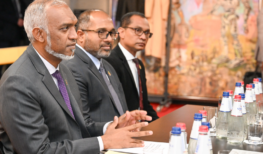Research Paper Detail Plight of Bangladeshi Migrant Workers

In a striking revelation, 70 percent of Bangladeshi migrant workers reported lacking access to their passports, according to research findings released yesterday by the Public Interest Law Centre (PILC).
The findings, detailed in a research paper titled “From Vulnerability to Exploitation: Bangladeshi Migrant Workers in the Maldives,” highlight the exploitative nature of migrant worker recruitment in the Maldives.
At a press event in Malé, PILC President Uza. Mariyam Shunana presented the research paper, accompanied by policy recommendations for the government.
The study, funded by a grant from the Asia Foundation, provides a comprehensive review of existing literature, an analysis of the current policy framework, and a quantitative survey of 847 respondents from 17 locations across the country.
“A Hierarchy of Suffering”
The report unveiled significant evidence of fraudulent recruitment practices, labour exploitation and discrimination, primarily affecting Bangladeshi migrant workers.
According to the study, over 94 percent of respondents had to pay recruitment fees of up to USD 2,200, with more than half resorting to loans to cover these costs, despite legal requirements for recruitment facilitators to bear these expenses.
Furthermore, the study found that over 70 percent of Bangladeshi workers entered the Maldives through legal channels, but the majority fell into irregular status post-migration.
Of those surveyed, 70 percent did not have their passports, and 40 percent reported that their passports were confiscated by agencies or agents.
Discrimination was also prevalent, with 21 percent facing bias based on their legal status and 40 percent experiencing discrimination due to their nationality. Over 70 percent of respondents reported working more than 54 hours per week, with the average salary being MVR 6,760.
PILC estimates the resident population at the time of data collection to be 187,290.
The team who conducted the research highlighted that although bangladeshi workers faced severe infringement of their rights, a majority of the responses put their experiences falling just short of being classified as trafficked persons according to indicators.
As a result, the workers are unable to seek remedies unless they are subjected to extreme exploitation and their issues are unacknowledged, creating a “hierarchy of suffering”.
A Call for Policy Action
The release of the paper at yesterday’s event was followed by a panel discussion featuring representatives from the government, parliament, trade unions, and PILC.
The policy recommendations accompanied by the research paper was widely discussed during the discussion, as various attendees urged the government to address the issues highlighted in the research.
Deputy Minister of Homeland Security and Technology Ashraf Mohamed Ali faced questions regarding the government’s ‘Operation Kurengi’ which is aimed at collecting biometric and photo IDs of all migrant workers in the Maldives.
Panelist and MP Mauroof Zakir argued that efforts to identify undocumented workers and regularise their status have failed to address the root causes of migrant workers becoming irregular workers.
PILC representatives expressed concerns about the government’s failure to adopt a rights-based approach to migrant worker management, noting that the ministry responsible for the migrant worker management and regularisation operates separately from institutions like the Labour Relations Authority and Employment Tribunal, which are tasked with ensuring workers’ rights.
Meanwhile, representatives from foreign embassies expressed concerns over the lack of communitcation about government initiatives to regularise workers and the processes for their citizens to voluntarily exit the country.






